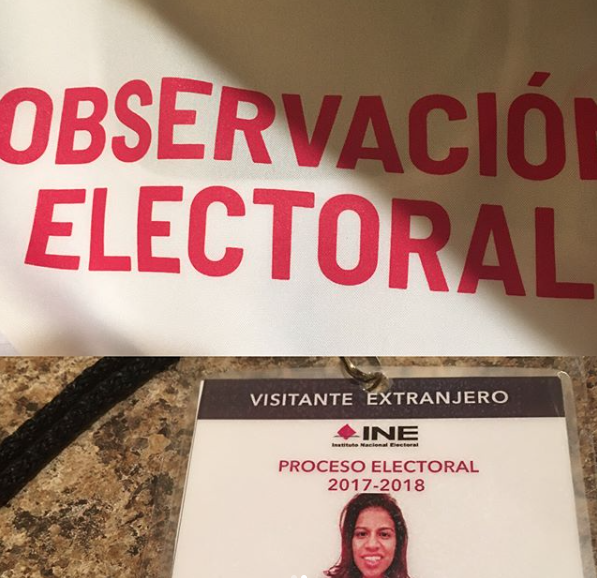
by Intern | Jul 10, 2018 | Program Leader, Volunteering
In 2006, I lived in Mexico City for several months and by the end of my time there, I had undeniably fell in love with the largest city in North America. While there, I had spent several months writing, directing, and editing a documentary film which captured the labor rights struggle of gas station attendants part of an independent Mexican service union. Through this process, I was able to hear the stories of more than 50 attendants and better understand the perils of organizing within an environment meant to protect corporatist interests.
While working on this documentary, I watched the 2006 general presidential election unfold. I watched from the sidelines the unsuccessful attempt of Andrés Manuel López Obradaor better known as AMLO, then a PRD (Party of the Democratic Revolution) candidate, to win the election. I witnessed firsthand the confusion and controversy that emerged out of the election and watched as AMLO’s supporters set up encampments inside the Zócalo (the famous main square in the center of Mexico City) for months, in protest of what was believed to be an electoral fraud.
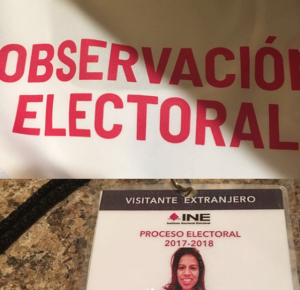
Marissa’s official ID and apparel for observing this year’s election.
It was also during that time I learned about the PRI (Institutional Revolutionary Party), the political party in Mexico that, up until 2000, had maintained political power for 71 years. I listened to countless stories of corruption, and the resulting desire for transparency for a “true democracy” in Mexico.
Twelve years later, I jumped at the opportunity with the UU College of Social Justice* to serve as an election observer for the 2018 general presidential election. According to Aljazeera via the Mexican National Electoral Institute (INE), the election was considered the “biggest election in Mexican history,” with numerous public issues being voted on and with “30 of 32 states [also holding] local elections.” In 2008, I had been an observer for the general Cambodia elections and was interesting in applying the skills I had learned there by participating in this historic election in the country of my ethnic roots.
Upon arriving in the country, I immediately was assigned to Xalapa, Veracruz, the capital of the third largest state within Mexico (four hours outside of Mexico City). I journeyed there together with a team of individuals from Argentina and Uruguay, as well as Mexican nationals. Throughout Mexico, there were dozens of volunteers from several different countries, all coordinated by the Red University and Citizen Network for Democracy (RUCD) and its affiliated networks, such as the Center for International Policy and Center of Human Rights Vitoria. We were tasked to lead a completely impartial observation over the course of three days. We strategized together and came up with a plan to visit as many polling sites as possible within the short time frame. At each site, we filled out forms assigned by RUCD to ensure that each polling site was following the correct procedures, that there were no irregularities at any of the sites, and that each person had access to vote safely and without pressure from any outside forces.
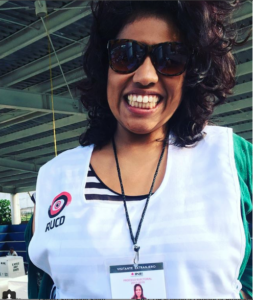
Marissa in her official election observation gear!
The day prior to the election, we visited with several different political party members, local members of human rights organizations, and attempted to visit several political party headquarters. At one of the party headquarters, we saw nearly four hundred individuals line up, with the hopes of receiving some sort of compensation for their political loyalty, a tragic reminder that corruption still lingers.
On the same day, we also participated in a press conference. Within 15 minutes, an array of different press affiliates from all across Veracruz met with us in a café at the center of the city. It was over as quickly as it had begun, and throughout the entire time the Argentina versus France World Cup game could be heard, blaring heavily in the background. [Note: you can see the article featuring Marissa and her team here.]
On the day of the election, we visited a school that had been converted into a tented polling place. At exactly 6PM local time, the sleepy polling site was closed to the public and was transformed by a frenzy of volunteers and polling staff into a frantic place of counting. Volunteers were racing against the clock as each of the votes were counted and recounted by hand. The sun slowly came down, and volunteers attempted to string a makeshift set of lights across the ceiling of the enormous tent. Alongside the authorized political party representatives, we watched as each vote was counted. Several hours later, the final counting of votes became to come in. Our polling site, along with many others across the country, began to input their votes into an electronic application, which showed that AMLO and his party, MORENA (National Regeneration Movement) would win by a landside, gathering nearly 53% of all the votes across the country.
After our long 15 hour day, as we slowly made our way back to our hotel, we soon realized that the hotel was the press conference central for the local MORENA officials. Upon stepping into the hotel, we were greeted by a flash mob of hugs, camera flashes, and loud cheers.
Later that night, myself and a group of the remaining observers went out to the central of Xalapa to see locals’ festivities in the city square. We watched as people cheered in celebration with guitars, car horns, bottles of beer, cups of corn, and hotdogs. One image still stands out to me: a young man pulls out a gigantic Mexican flag and waves it back and forth. I go up to him and ask him if I can take a picture and he cheerfully obliges. I watch the flag drift through the air, fluid against the night sky. Maybe the winds of change have come after all.
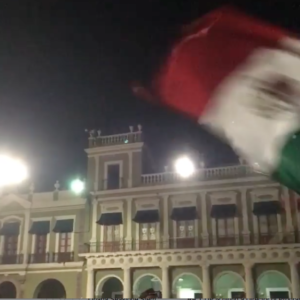
The Mexican flag waves in the air after the election.
* The UUCSJ is grateful to the following partner organizations who made this trip possible: the Center for International Policy (CIP), the Americas Program, and the Red Universitaria y Ciudadana por la Democracia (RUCD) [EN: the Red University and Citizen Network for Democracy]
Marissa Gutierrez-Vicario is the Founder and Executive Director of Art and Resistance Through Education (ARTE), an organization that helps young people amplify their voices and organize for human rights change in their communities through the arts. She has been active with UUSC and is currently a program leader and advisory board member for UUCSJ.
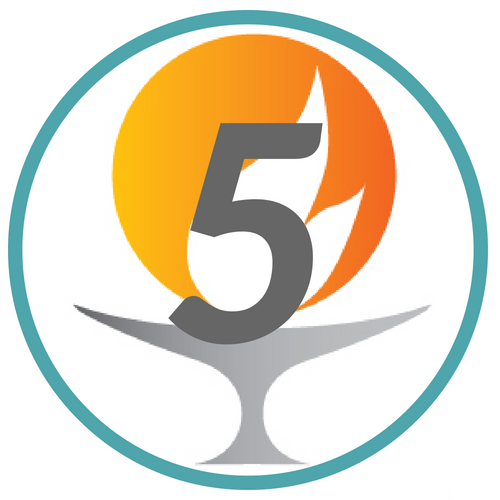
by Heather Vickery | Jun 15, 2018 | General Assembly, Pastoral, Program Leader
Are you going to Kansas City for the UUA’s General Assembly 2018? UUCSJ is and we would love to have you stop by our booth to say hello. If you need some convincing, here are the top 5 reasons YOU should visit us at GA!

Get this year’s button!
Every year, we at UUCSJ pick a quote that connects to the theme at GA and spreads a message aligned with our values. General Assembly is your first (and often last) chance to get each button as we never print more than what we bring with us. Stop by our booth in the exhibit hall (this year we are with the UUSC) and grab yours.
 Talk to UUCSJ staff, Program Leaders and Alumni Leaders
Talk to UUCSJ staff, Program Leaders and Alumni Leaders
As usual, Heather (our Senior Associate for Outreach, Enrollment and Administration) will be at the booth the most often, but you will also have chances to talk to Deva Jones (Senior Associate for Service Learning and Internships), Gina Collignon (Senior Associate for Immersion Learning), the Rev. Kathleen McTigue (our Director), our three alumni leaders and maybe even some of our fabulous program leaders.
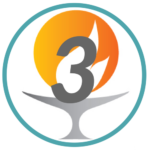
Get a daily meditative reading in
This year, we will have a daily meditation at our booth, so wander by and take some time to spiritually center yourself during the hustle and bustle of GA.
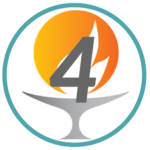
Ask about our new congregational starter kits
Are you interested in getting a group from your congregation on one of our immersion learning journeys? Do you want more people to know about our internship and volunteer programs? Ask about our new congregational starter kits full of information and promotional materials to help you inspire social justice activism in your church.
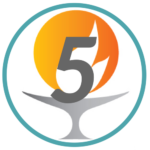
The ribbons of course!
We have ribbons, yes we do. We have ribbons so can you! Stop by our booth and sign up to receive our monthly newsletter (or let us know you already are signed up) and we’ll give you one of our UU College of Social Justice ribbons to add to your collection.
by Deva Jones | Jun 8, 2017 | General Assembly, Program Leader, Racial Justice, Sanctuary and Solidarity, Volunteering, Young Adult, Youth
UUCSJ offers a variety of Activate Youth Justice programs, including at General Assembly. This year, for the first time, we are excited to welcome a team of awesome Activate Youth Leaders who are helping shape, facilitate, and promote our youth justice workshops in New Orleans, in collaboration with the Youth Caucus team. Get to know the Activate Youth Leaders (and a few adults, too) via their bios below and come say “Hello!” if you’ll be in New Orleans in June!
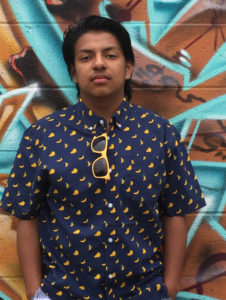
Pablo deVos-Deak is finishing his freshman year of high school and attends the Unitarian Society of New Haven, where he serves as a K1 teacher and is involved with his youth group. Born in Guatemala, he has traveled the world and most recently gone to China for two weeks. Pablo is very passionate about social justice and among other youth leadership experiences, has participated in a youth visit to the College of Social Justice and workshops at the UU-UNO Spring Seminar. Along with being a “sneaker-head” and playing three sports, he also loves trying new foods, playing the the piano, drums and steel pans, and listening to Logic. He looks forward to attending his 7th GA this year!
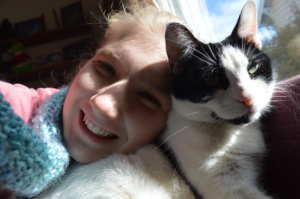 Adele Gelperin is a rising junior at Mount Holyoke College, where they study religion and education. They grew up in the Unitarian Society of New Haven and now call Unitarian Society of Northampton and Florence a second home. Adele is a handbell enthusiast, a bookworm, and an aspiring elementary school teacher, who can often be found singing songs from Moana, arguing about philosophy, and tromping through the woods. They are an alum of Activate Boston (when it was known as National Youth Justice Training) and are thrilled to join the UUCSJ team and meet even more UUs at GA this year.
Adele Gelperin is a rising junior at Mount Holyoke College, where they study religion and education. They grew up in the Unitarian Society of New Haven and now call Unitarian Society of Northampton and Florence a second home. Adele is a handbell enthusiast, a bookworm, and an aspiring elementary school teacher, who can often be found singing songs from Moana, arguing about philosophy, and tromping through the woods. They are an alum of Activate Boston (when it was known as National Youth Justice Training) and are thrilled to join the UUCSJ team and meet even more UUs at GA this year.
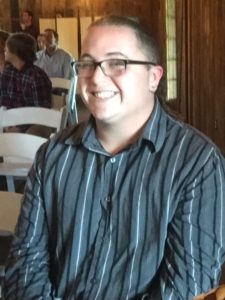
Liam McAlpin is a rising high school sophomore from Tahlequah, Oklahoma. He is a member of the Unitarian Universalist Congregation of Tahlequah and attends Sequoyah High School, an all Native tribal school run by Cherokee Nation, where he is a member of his school’s student council and strives to make his school and community a safe and better place for all. Liam also attends Squirrel Ridge, one of the last remaining traditional Cherokee ceremonial grounds, where he is a proud member of the ground’s leadership and helps keep his Cherokee culture and spirituality alive. When Liam has free time, which isn’t that common, he enjoys making and listening to music, writing poetry and short stories, and spending time with his family and friends.
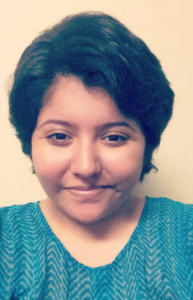
Chloe Ockey attends the Unitarian Universalist Church of Fresno in Fresno, California. She is currently a college sophomore majoring in Communication Studies, who wishes to pursue a career in Public Relations. Some of her many hobbies include music composition, writing, and travel. As an alum of Luminary Leaders, Activate Boston, and Thrive West, she has participated in a variety of opportunities related to UU youth leadership and social justice. She can’t wait to meet all of you at General Assembly this year!
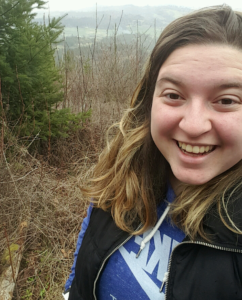 Abiy Welch is a first-year student at the University of Oregon in Eugene, Oregon. Her hometown is Hillsboro, Oregon and she attends both West Hills UU Fellowship and the UU Church of Eugene. She is a ‘13 GoldMine alumni, ’15 Summer Seminary alumni, is a member of the PWR GoldMine staff and is a peer chaplain. In 2016, she went to New Orleans for UUCSJ Activate Racial Justice! In her free time, she loves to sing hymns and read children’s books to others. The biggest thing that she took away from her Activate! trip was to find something you are passionate about, find that community, and stick to it. Join Abiy at GA for some food, coffee, or just a chat about anything and everything! She says, “Remember: Always. Believe. In. Yourself!”
Abiy Welch is a first-year student at the University of Oregon in Eugene, Oregon. Her hometown is Hillsboro, Oregon and she attends both West Hills UU Fellowship and the UU Church of Eugene. She is a ‘13 GoldMine alumni, ’15 Summer Seminary alumni, is a member of the PWR GoldMine staff and is a peer chaplain. In 2016, she went to New Orleans for UUCSJ Activate Racial Justice! In her free time, she loves to sing hymns and read children’s books to others. The biggest thing that she took away from her Activate! trip was to find something you are passionate about, find that community, and stick to it. Join Abiy at GA for some food, coffee, or just a chat about anything and everything! She says, “Remember: Always. Believe. In. Yourself!”
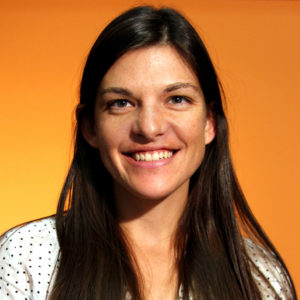 Kristin Famula has been a religious educator for the past decade, currently serving as the Acting Director of Religious Education at the UU Community of the Mountains in Grass Valley, CA, and previously as Director of Religious Education at Prairie UU Church in Colorado. As an educator and a life-long UU, she works to create and offer opportunities for people of all ages to deepen their commitment to transforming systems of oppression through reflection, learning and relationships. Kristin also serves as President of the National Peace Academy (nationalpeaceacademy.us), an educational institute dedicated to holistic peace-building. The National Peace Academy focuses on developing and offering learning opportunities for bringing forth the peace-builder in all of us, including through international opportunities for youth leadership and cultural exchange. As a UUCSJ Program Leader, Kristin has led several immersion learning journeys, including last year’s Activate New Orleans and a recent youth journey to the US/Mexico border.
Kristin Famula has been a religious educator for the past decade, currently serving as the Acting Director of Religious Education at the UU Community of the Mountains in Grass Valley, CA, and previously as Director of Religious Education at Prairie UU Church in Colorado. As an educator and a life-long UU, she works to create and offer opportunities for people of all ages to deepen their commitment to transforming systems of oppression through reflection, learning and relationships. Kristin also serves as President of the National Peace Academy (nationalpeaceacademy.us), an educational institute dedicated to holistic peace-building. The National Peace Academy focuses on developing and offering learning opportunities for bringing forth the peace-builder in all of us, including through international opportunities for youth leadership and cultural exchange. As a UUCSJ Program Leader, Kristin has led several immersion learning journeys, including last year’s Activate New Orleans and a recent youth journey to the US/Mexico border.
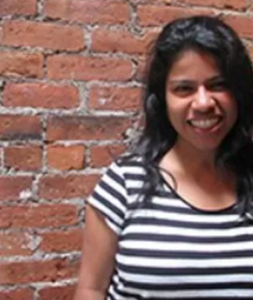 Marissa Gutierrez-Vicario is a UUCSJ Program Leader and the Founder and Executive Director of Art and Resistance Through Education (ARTE). As a committed human rights activist, artist, educator, and advocate for youth, Marissa launched ARTE in 2013 to help young people amplify their voices and organize for human rights and social change in their communities through the arts. Since early childhood, Marissa became interested in the arts and its potential for bringing attention to important social issues within her community. At an early age, Marissa also developed the propensity to lead as a student activist and public servant through her involvement in several non-profit organizations, including: United Students Against Sweatshops, the Advocacy Lab, Public Allies New York, Global Kids, and the UUA. In all of these experiences, Marissa realized the need to support young people in their development as organizers to help cultivate the next generation of social justice leaders. She has recently supported UUCSJ’s expansion of new initiatives in Nicaragua and new training collaborations such as the UNO Spring Seminar.
Marissa Gutierrez-Vicario is a UUCSJ Program Leader and the Founder and Executive Director of Art and Resistance Through Education (ARTE). As a committed human rights activist, artist, educator, and advocate for youth, Marissa launched ARTE in 2013 to help young people amplify their voices and organize for human rights and social change in their communities through the arts. Since early childhood, Marissa became interested in the arts and its potential for bringing attention to important social issues within her community. At an early age, Marissa also developed the propensity to lead as a student activist and public servant through her involvement in several non-profit organizations, including: United Students Against Sweatshops, the Advocacy Lab, Public Allies New York, Global Kids, and the UUA. In all of these experiences, Marissa realized the need to support young people in their development as organizers to help cultivate the next generation of social justice leaders. She has recently supported UUCSJ’s expansion of new initiatives in Nicaragua and new training collaborations such as the UNO Spring Seminar.
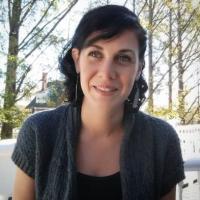 Angela Kelly is SO grateful to be working with this amazing Activate@GA team and in collaboration with the awesome Youth Caucus staff! As Senior Associate for Justice Education at UUCSJ, her work focuses on developing opportunities to integrate activism, popular education, and spiritual practice. As a teen, immersion learning journeys fueled her own passion for human rights and social justice and in the years since, supporting youth leadership has remained an energizing component of her work, which has included 15 years of organizing in various contexts for peace, community empowerment, health equity, refugee solidarity, and racial justice. These days, being rooted in her neighborhood, running in nature, circling up with kindred spirits, painting and scattering #KindnessRocks, and hanging out in child’s pose renew and sustain her ability to “rejoice & resist”.
Angela Kelly is SO grateful to be working with this amazing Activate@GA team and in collaboration with the awesome Youth Caucus staff! As Senior Associate for Justice Education at UUCSJ, her work focuses on developing opportunities to integrate activism, popular education, and spiritual practice. As a teen, immersion learning journeys fueled her own passion for human rights and social justice and in the years since, supporting youth leadership has remained an energizing component of her work, which has included 15 years of organizing in various contexts for peace, community empowerment, health equity, refugee solidarity, and racial justice. These days, being rooted in her neighborhood, running in nature, circling up with kindred spirits, painting and scattering #KindnessRocks, and hanging out in child’s pose renew and sustain her ability to “rejoice & resist”.
We all look forward to seeing you soon!

by Heather Vickery | Apr 8, 2016 | Program Leader, Youth
Read Part 1 of Sam’s Blog, “Why I Love My Work”
What exactly is so special about Activate Youth Justice Trainings that so many of its alums claim to have gone through such an intense and life-changing experience? The simplest explanation for what happens during Activate! is to break it down to these 5 main concepts: Education, Engagement, Growth, Community & Transformation.
Education and Engagement: We use interactive, participatory and fun activities to start learning more about the issues as a group. Meanwhile, we engage groups in activism and hands-on justice work that is happening in the area while we are there. As such, programming evolves and shifts with each passing year as different justice issues emerge and grow. Our programs maintain a certain level of flexibility so that we can respond immediately to current events, and each program is uniquely tailored to focus on an issue that is especially relevant in that region of the country. In 2013, for example, our group immediately switched up our schedule and took to the streets to join other Boston activists in protest when George Zimmerman was found not guilty for killing Trayvon Martin. Last summer, in Tucson, our youth joined a movement for immigration justice to #StandWithRosa as she found Sanctuary from deportation in a local church (pictured below, at an event in support of Rosa’s right to remain in the United States).
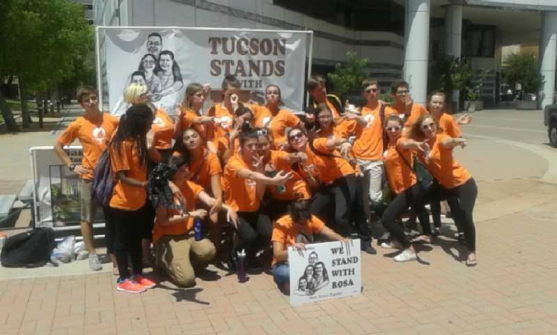
Activate Tucson youth assisting at a big public event to raise awareness about the #StandwithRosa campaign in Tucson. They also helped distribute over 100 lawn signs in the community as part of their work.
Growth: Youth are encouraged to come to terms directly with the identities that they hold and what this means in terms of their privilege and power within different systems. As Jenna Peeples, Activate Tucson ’13 alum, explains: “Even if only for a moment, we are ejected from our concentrated high school lives and put somewhere outside of our comfort zone; this allows us to open our eyes. We catch sight of not only our privilege, but the urgency that is associated with various issues going on around us.” Although participants do not need to be Unitarian Universalist to attend these trainings (and certainly some of our most enthusiastic participants were members of different faiths!) we do incorporate various UU elements and there is an emphasis on spiritual growth. Teens will have time to learn and try out a variety of spiritual practices, as well as plan and run their own youth worship in small groups. This in turn supports the difficult identity and justice-related work. Julia explains: “The UU component made it a place where I felt safe, even when faced with uncomfortable ideas.”
Community: Throughout the week, we do all kinds of fun things to build a tight-knit community amongst ourselves, and then extend that community to build relationships with the local justice-related organizations we’re in partnership with. In some programs teens will cook together, in others they form family groups that spend time reflecting and supporting each other’s processing etc., and we also engage the larger group in a variety of fun community-building and empowering activities. Each cohort has its own Facebook page, and teens often continue posting things many years after the trainings. I cannot even begin to explain how exciting it is in the weeks following these trainings to see the flurry of posts on the group pages about what cool justice thing each is now doing, what exciting protest they are going to that weekend, what thing happened that suddenly reminded them of this or that (and now they have “all the feels”). They form these really special friendships quickly over their shared values and immediate submersion in such difficult, meaningful work together.
Transformation: All of the above ultimately leads to these incredibly exciting transformations for the participants, who soon find themselves overwhelmingly inspired by what they have learned, seen and done. They feel empowered by the experiences and the tools they have picked up along the way; their engagement in social justice work has been *activated* and they go back to their congregations and communities with this freshly-revitalized sense of purpose.
FOR MORE INFO. AND TO APPLY TO CSJ’S SUMMER YOUTH ACTIVATE PROGRAMS, PLEASE CLICK HERE!
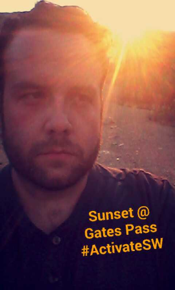 Sam was consistently struck by the juxtaposition of such hideous, dehumanizing and tragic acts of hatred toward people crossing the border; set against the natural beauty and allure of the sunsets in Tucson.
Sam was consistently struck by the juxtaposition of such hideous, dehumanizing and tragic acts of hatred toward people crossing the border; set against the natural beauty and allure of the sunsets in Tucson.
Questions about Activate! and how to support your youth in attending an upcoming Justice Training? Email Sam at swilson@uucsj.org

by Heather Vickery | Mar 29, 2016 | Program Leader, Youth
A Program Leader Reflects on UU Youth as the Present and the Future; The Change We All Wish to See
My name is Sam Wilson, and my primary job is to serve Winchester Unitarian Society (WUS) as their Director of Youth Ministries, which means that I feel incredibly blessed to count myself amongst those who truly love what they do! I also have the incredible fortune of being a Program Leader for the UU College of Social Justice, which means that during my time off from WUS over the summer, I get to meet and connect with even more UU teens by leading UUCSJ Activate! Youth Justice Trainings. I actually found the CSJ booth at its debut UUA General Assembly in Charlotte rather accidentally; I was still in college at the time and wanted to see how I could transfer there!
Cut to 4 years and 4 more GAs later, and I have now proudly led 2 Youth Justice Trainings in Boston and the pilot Activate! Training in Tucson last summer, helped with 1 pre-GA Activate! training for youth, served on panels for 3 CSJ-led workshops on youth and justice work, and even manned that CSJ booth a few times while explaining to several different people that the name is actually a bit of a misnomer, and no, you cannot actually get a college-level degree from us! I also always add that you can, however, get the experiential and transformative education of a lifetime in way less time (and without any student loans afterward, too!)
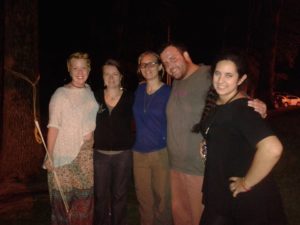
All youth staff for NYJT ’14 (now called Activate). From left to right: Ravenna, Charis, Kye, Sam and Alexandria
As you can probably tell, I am a big fan of working for CSJ, and really enjoy doing as much as I can to support them. There is one thing, however, that really bums me out about this work, sometimes a program doesn’t run. Last summer I was all set to lead my 3rd Youth Justice Training in Boston, but the program was cancelled due to under-enrollment. You might be thinking “who cares; if only a few youth signed up then there were only a few people who didn’t get to do it.” Here’s the thing, though. Every single youth I have ever talked to about their experience during Activate! tells me some version of the following:
“The Boston trip was one of the most formative experiences of my life… I was a completely different person before and after and it left me with a desire to make the world a better place, while giving me the tools to do so… It’s an experience that everyone should try to have to better themselves and the world.”- This quote comes from Julia Nichols, a teen I first met in 2013 at the Boston Training, and then again in 2015 when she came back for Activate! Tucson (where I was thrilled to hear about all of the justice work she had been doing at her school in the interim). Julia intends to do the NOLA Activate! with us this summer, too, and is one of several planning on attending their 3rd training with us then.
What this means, though, is that every slot that is not filled by someone on an Activate! Program means one fewer young person who gets to have a life-changing experience that summer, who has the tools to become a thoughtful and engaged activist before even getting to college, and who goes back to their congregation and community excited to share their newfound passion and skills with other potential advocates, allies and activists.
Activate Alum, Alexandria Boutros, has said, “There are so many UU youth all over the country who would love this. I did this program… and then my life became justice.” I first met Alexandria at the Boston Training in 2013. Now she is a sophomore at DePaul University, where she majors in Peace and Justice Studies with a Minor in Community Service Studies, while interning for The Food Chain Workers’ Alliance. She continues: “I literally would not be at DePaul right now, studying Peace and Justice, if it were not for the Boston training.”
For me, these programs represent the convergence of my two main passions: ministry with youth, and social justice work. I am simply amazed by the thoughtfulness, intelligence, compassion and individuality that each set of UU youth brings every year. Plus, like these youth, I am a big fan of keeping things interesting by contrasting absurd irreverence (let’s make pancakes! With pink food coloring! And cloud sprinkles! While dancing!) with deep, heartfelt moments of reverence, grace, love, and often sadness too. Every single training I have attended there is at least one moment where I am caught off-guard by my own immense pain at learning about some new, insidious manifestation of hatred and injustice that I had not previously considered. Suddenly tears are flowing down my face, and I’m momentarily flustered as our roles are briefly reversed and the teen asks me if I’m okay while offering a hug.
I’ll wrap my thoughts up by letting readers in on a little secret (that I’d bet resonates with most if not all of the other people who get to work with UU youth). I love this work for the exact same reasons that all of these teens do. In our programs, the youth and adults simultaneously act as participants and leaders, teachers and learners, speakers and listeners, poets and readers, and worshippers and preachers. For I, too, always emerge from these trainings a different person from the week before. My eyes are cracked open just that much more to truth; my heart set that much stronger on paving the road to justice with equity and love.
Read Sam’s follow up post “5 Reasons Why You Need to Tell Every Teenager You Know to Apply Now!”








 Talk to UUCSJ staff, Program Leaders and Alumni Leaders
Talk to UUCSJ staff, Program Leaders and Alumni Leaders



 Adele Gelperin
Adele Gelperin

 Abiy Welch
Abiy Welch Kristin Famula
Kristin Famula Marissa Gutierrez-Vicario
Marissa Gutierrez-Vicario Angela Kelly is SO grateful to be working with this amazing
Angela Kelly is SO grateful to be working with this amazing 


